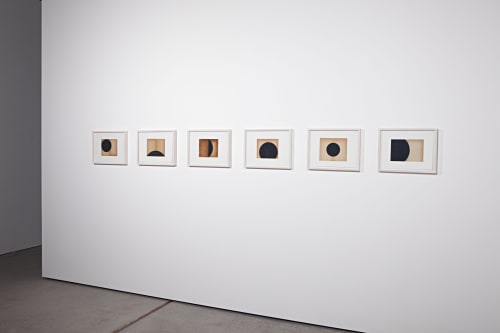Alrededor: Galeria Luisa Strina
ALREDEDOR/ Sorroundings PABLO ACCINELLI The functional relation between an object and a tool of analysis of the visual information is one of the questions that Pablo Accinelli (Buenos Aires, 1983) has been circulating ever since the latter years of the past decade. In his drawings and objects, the reduction of the elements to their quantifiable level is in sync with the protagonism of measuring tools: rulers, squares and colour systems susceptible of application by a user on a data structure, as though they were the graphic interface of an image-editing program.
In the works presented in Alrededor (surroundings), Accinelli progresses from the ratification of the formal list of analysis mechanisms to a search of the metaphorical meaning that a morphologic characteristic may adopt if projected in space, the manner in which a family of circles is extracted from a pair of compasses. The interest present in the concise and frequently anecdotic works range from the objectivity of the image to the capture of constructive relations which are organized in supports and various shapes by the projected image. Different everyday objects materialise a stratum of spatial and sensitive possibilities through the transition from the literal to the metaphorical: the turning of a page reveals itself in half a wheel of concrete; the expansive wave of a goal portrayed in a picture generates a curve on the flat mesh; an architecture template rises up and generates an aerial view of a group of buildings. Simple mechanisms of transfer and extrapolation explain this projective reasoning, in which the protagonist is no longer the abstract user of the information, but an experimenter who moves through the metaphorical meaning of the image: the shards of a sharpened pencil may be similar to the sharp tips of a tower and vice versa. Accinelli’s focus migrates from the design to the object, the analysis instruments which are susceptible of being amplified in the plane move towards physical materialisations of those experiments, organised in shelves: a sort of work logbook composed by tridimensional metaphors.
Mirar: construer (Look: construct) is the work that most deepens this relation between the literal and metaphorical meanings of the projection. The work is composed of two identical orthogonal structures separated by a mirror: the identity between the referent its reflection materialises itself in the physical repetition of this image. The title is structured as a dictionary entry. To look is to construct, or yet, to construct is to project, in the literal and metaphorical meanings of the term.
The projection presents itself as an instrument to take those mechanisms of image analysis beyond themselves, transferring them from a state of response to a state of question, anticipation or expectation. By emphasising the spectator’s perceptual and cognitive domain, the works anticipate the ludic work of the mind, which discovers connections, resemblances and counterpoints in the data it receives. Nonetheless, more than insisting on the artificial character of our perception, Accinelli seeks to involve the spectator in an exercise of greater scope: that the experience of looking constitutes a practical problem.









